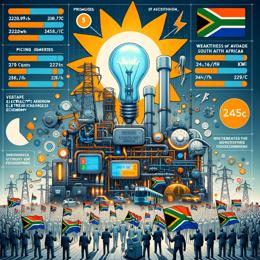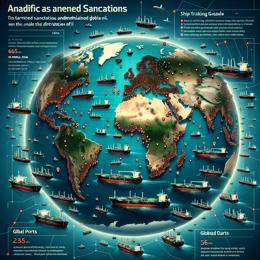Image created by AI
CEF Takes Helm of SAPREF Refinery to Strengthen South Africa's Energy Security
In an assertive move to revitalize South Africa's energy landscape, the Central Energy Fund (CEF) has successfully received approval from the Competition Commission to take over the assets of the dormant SAPREF Refinery. This strategic acquisition promises to invigorate the country's energy security and unlock new avenues for economic growth.
Once a joint venture between energy titans Shell and BP, the SAPREF Refinery in Durban, KwaZulu-Natal, has been inactive for several years, burdened by operational difficulties. Nevertheless, with the CEF's proven expertise in the energy domain through its subsidiaries such as PetroSA and Avedia Energy, there’s a palpable sense of optimism regarding the refinery's future.
PetroSA, once operating a gas-to-liquids refinery in Mossel Bay, and Avedia Energy, an LPG company with facilities in Saldanha Bay and Cape Town, are set to leverage their collective experience to rejuvenate the SAPREF Refinery. The goal is to produce vital petroleum products including gasoline, diesel, and jet fuel, crucial for meeting national demands.
Securing the refinery's transition, the Competition Commission has ruled that the move is unlikely to affect competition adversely. Moreover, a key consideration in the approval process is the safeguarding of employment, with a mandate that SAPREF employees retain their jobs under the CEF with comparable terms.
This shift in ownership comes as major players like BP, Shell, and TotalEnergies downscale local operations, prompted by cost concerns and a sluggish South African economy that has seen negligible growth over the past two decades. Global market pressures and a local environment that has seen better days are influencing these oil companies to strategically retreat from South African ventures.
TotalEnergies, withdrawing from its explorative projects off the coast, Shell divesting from local downstream operations, and BP leaving the jet fuel business in South Africa are examples of the energy landscape rapidly transforming. The companies are impacted by both investor pressures to trim costs and a recognition that South African operations no longer align with their economic objectives.
The CEF’s move to acquire the SAPREF Refinery reflects the South African government's attempt to assert more control over the country's energy resources, focusing on stability and the long-term growth of the sector. The plan to operationalize and upgrade the refinery infrastructure indicates a strong commitment towards self-sufficiency in energy production and aligns with broader national development goals.










